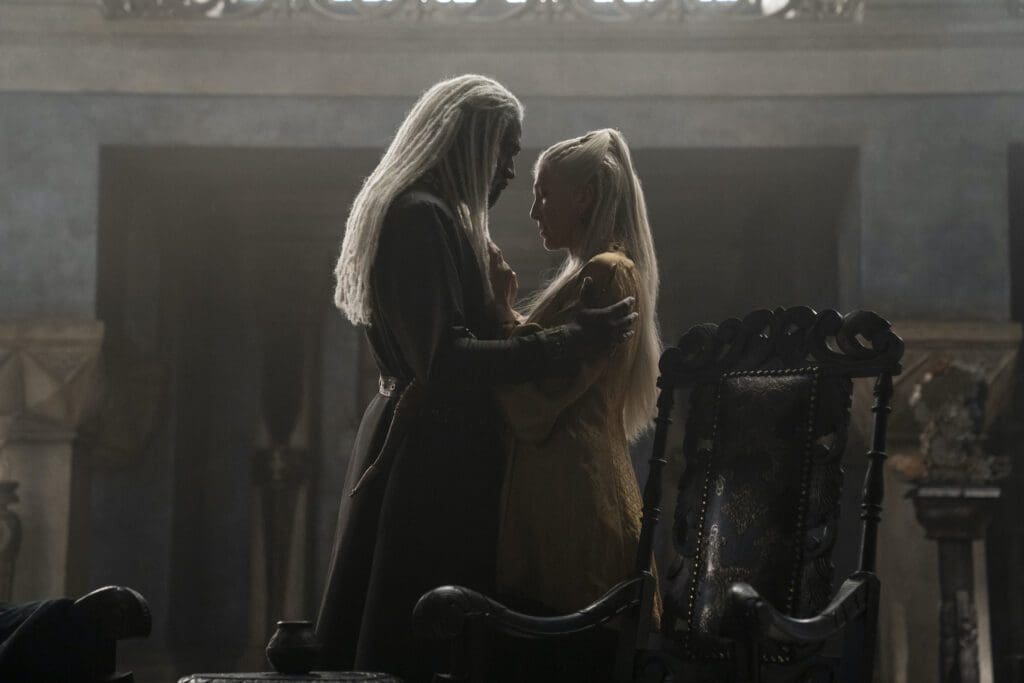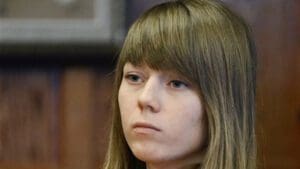Summary
House of the Dragon turns dry pseudo-history into riveting character drama, rejuvenating a franchise and evoking its glory days all in one season.
When the finale of Game of Thrones turned out to be one of the most maligned and anticlimactic ends to a beloved show in television history, it was almost inconceivable that its prequel series, House of the Dragon, would become as good as, if not better, than its predecessor. And yet across ten episodes, Season 1 does precisely that.
Being set 200 years before Game of Thrones and not sharing any of its core characters – even if almost all of those characters share surnames and complicated family dynasties – was clearly an advantage. House of the Dragon also benefits from being based on George R. R. Martin’s novel Fire and Blood, a completed work that doesn’t require David Benioff and D. B. Weiss to essentially freestyle a climax.
Wheeling back two centuries of Westerosi history introduces us to three generations of the dragon-riding, silver-haired Targaryen family, with lots of new names and faces to learn but a recognizable geography and mythology to position them all in. From the outset, Season 1 uses familiar touchstones like King’s Landing and Dragonstone to orient us in this new version of an old world, ruled (almost) unopposed by flying weapons of mass destruction rendered in impressively lifelike CGI.
Despite the reused theme music and sets, House of the Dragon feels, immediately, like a different show. It has a narrower scope, focusing exclusively on the brand new cast and their royal plotting and incestuous relationships instead of a wider brewing conflict, even though Season 1 does build, inevitably, towards a civil war. While that can sometimes make the story feel hemmed in, it’s realistically the only approach that would work with such a large cast navigating a twenty-odd-year timeline.
But that timeline does cause some issues. There are multiple years-long time skips in Season 1, with core characters regularly being replaced by new actors. The show does little to orient the audience when these shifts occur, leaving us to wonder for a few confused minutes whether Milly Alcock is suddenly Emma Carey now or if this is a completely new character. Princess Rhaenyra and Queen Alicent Hightower are both victims of Sudden Actor Replacement Syndrome, as are several of the younger characters, including the children of both of those leads.
However, there is consistency in some areas that helps us to keep up. Paddy Considine remains as Viserys even as the years and ill-health ravage him into an unrecognizable, monstrous husk, and it’s a fine performance for a complex character. The same can be said of Matt Smith’s Daemon, the most oddly charming of the bunch, especially given his enormous capacity for violence, sadism, and incest.
But you have to take what you can get in House of the Dragon. This is a show without heroes. There is no analog for any of the noble Starks like Ned, Arya, and Sansa, there’s no obvious hero archetype like Jon Snow. Everyone’s out for themselves, and we’re following a family that has ruled in some capacity – through fire and blood, rather than diplomacy – for basically its entire existence. That breeds a kind of wacky depravity and entitlement that most obviously evokes that of the Lannisters in Game of Thrones, though several of the Targaryens are arguably worse.
Sometimes House of the Dragon takes this mandate of being about awful people too far, or at least displays it in too-obvious ways. In the early going there are bouts of violence that feel try-hand and deliberate in their attempts to shock. Even later on, as the years pass and war brews, some of the character depictions are overly simplistic. Aegon Targaryen (Tom Glynn-Carney) has pastimes so wildly villainous that the character is irredeemable before he has even had a chance to become the focus of the story, as he will in Season 2, and his brother Aemond (Ewan Mitchell) looks and acts like a comic book villain.
Even Larys Strong (Matthew Needham), the obligatory Littlefinger-alike, reveals even worse attributes than the scheming and plotting he’s known for. Late on, he starts pleasuring himself to the sight of Alicent’s bare feet for seemingly no reason other than it’s just another creepy attribute for a guy like this to have.
The kindest and most accurate thing you can say for House of the Dragon is that it’s about as good as a setup for an inevitably better follow-up season can get. It’s quite by design that these first ten episodes are intended to introduce the key players and the core motivations in a bloody upcoming civil war which will break out and develop throughout at least one more season. It can be slow, ponderous, and confusing at times, but it’s never boring, and that’s quite an achievement.
It also promises not only more of the same but some new things besides, with the fiery might of the dragons – curiously underused in Season 1 – representing an exciting new wrinkle in the battle for the Iron Throne. And it’s mightily impressive that such an engaging series has been sprung from a work as dry as Fire and Blood, essentially an in-universe history textbook.
With the additional context of Season 2, I imagine that people will look back more fondly on House of the Dragon Season 1, seeing it quite rightly as the calm before the coming storm. But even outside of that macro context, it’s a fine series in its own right, delivering all the political machinations, gore, depravity, and royal plotting that the franchise is known for in spades.



